Is your computer screen turned into a blue screen after you update your computer system? You’re not alone. Many Windows users have reported this ‘Windows 10 Blue screen after update’ error. Don’t worry, it’s usually not too hard to fix.
Before you try any fixes:
Restart your computer to the normal mode
The first thing to do when you meet the blue screen error is to restart your computer and back to normal Windows system.
How: Hold your computer’s Power button for about 5 seconds to restart.
If you can’t reboot your computer into normal mode in this way, you need to enter safe mode.
After that, restart the computer to see if the system was back to normal.
Try these fixes…
When you back to normal system, here are 7 fixes for you to try. You may not need to try them all; just work your way down until you find the one that works for you.
- Update the graphics driver
- Run the Windows Update Troubleshooter
- Repair system files
- Clear any existed viruses
- Uninstall newly installed hardware/software
- Give your computer enough storage space
- Restore your system
- Reset or reinstall Windows
Fix 1: Update the graphics driver
One of the most common causes of this error is corrupted or outdated device drivers. So you should definitely try updating your drivers before trying anything more complicated.
There are two ways you can update your driver: manually and automatically.
Option 1 – Manually– You’ll need some computer skills and patience to update your drivers this way, because you need to find exactly the right the driver online, download it and install it step by step.
OR
Option 2 – Automatically (Recommended)– This is the quickest and easiest option. It’s all done with just a couple of mouse clicks – easy even if you’re a computer newbie.
Option 1 – Download and install the driver manually
You can download graphics drivers from the manufacturer official website. Search for the model you have and find the correct driver that suits your specific operating system. Then download the driver manually.
Option 2 – Automatically update drivers
If you don’t have time or patience to manually update your graphics drivers, you can do it automatically with Driver Easy.
Driver Easy will automatically recognize your system and find the correct drivers for it. You don’t need to know exactly what system your computer is running, you don’t need to risk downloading and installing the wrong driver, and you don’t need to worry about making a mistake when installing.
You can update your drivers automatically with either the FREE or the Pro version of Driver Easy. But with the Pro version it takes just 2 clicks (and you get full support and a 30-day money back guarantee):
- Download and install Driver Easy.
- Run Driver Easy and click the Scan Now button. Driver Easy will then scan your computer and detect any problem drivers.

- Click the Update button next to the flagged driver to automatically download the correct version of that driver, then you can manually install it (you can do this with the FREE version).
Or click Update All to automatically download and install the correct version of all the drivers that are missing or out of date on your system. (This requires the Pro version which comes with full support and a 30-day money back guarantee. You’ll be prompted to upgrade when you click Update All.)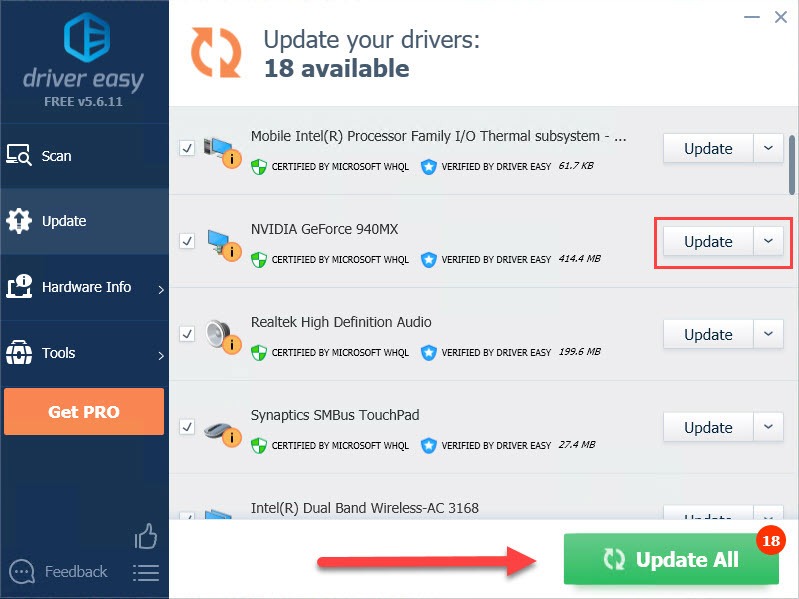
Be sure to attach the URL of this article if needed for more expedient and efficient guidance.
Fix 2: Run the Windows Update Troubleshooter
The Blue screen error may be related to a Windows Update error. The Windows Update Troubleshooter is an inbuilt tool that helps to fix Windows Update errors. Here’s how to run it:
- On your keyboard, press the Windows Key (with windows logo) and I (the “i” key) together.
- Click Update & Security.
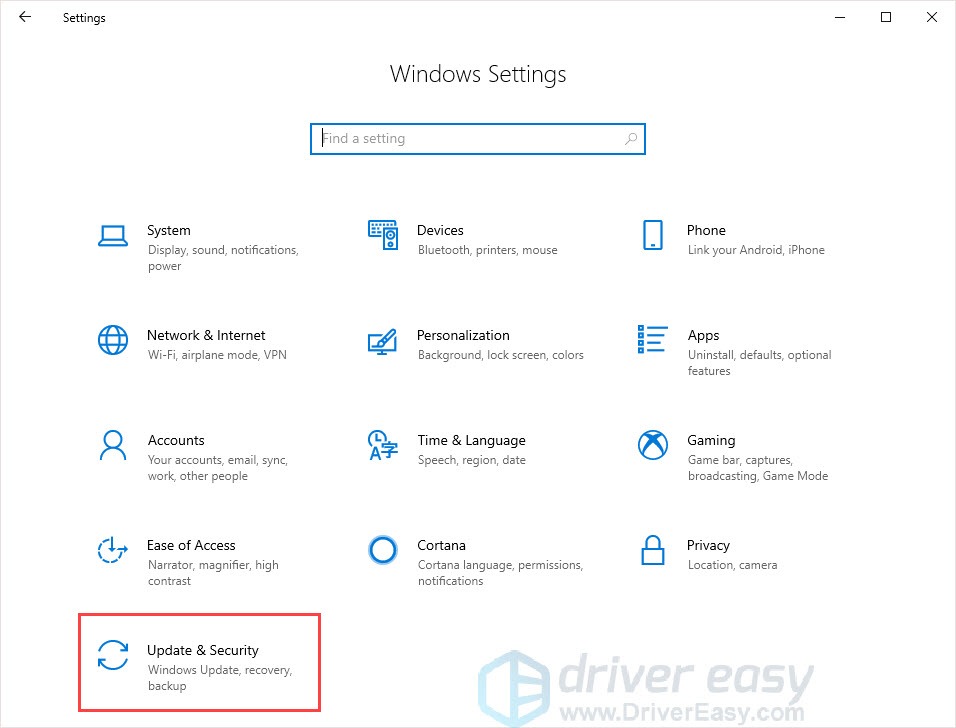
- Under Troubleshoot tab click Windows Update and then click Run the troubleshooter.
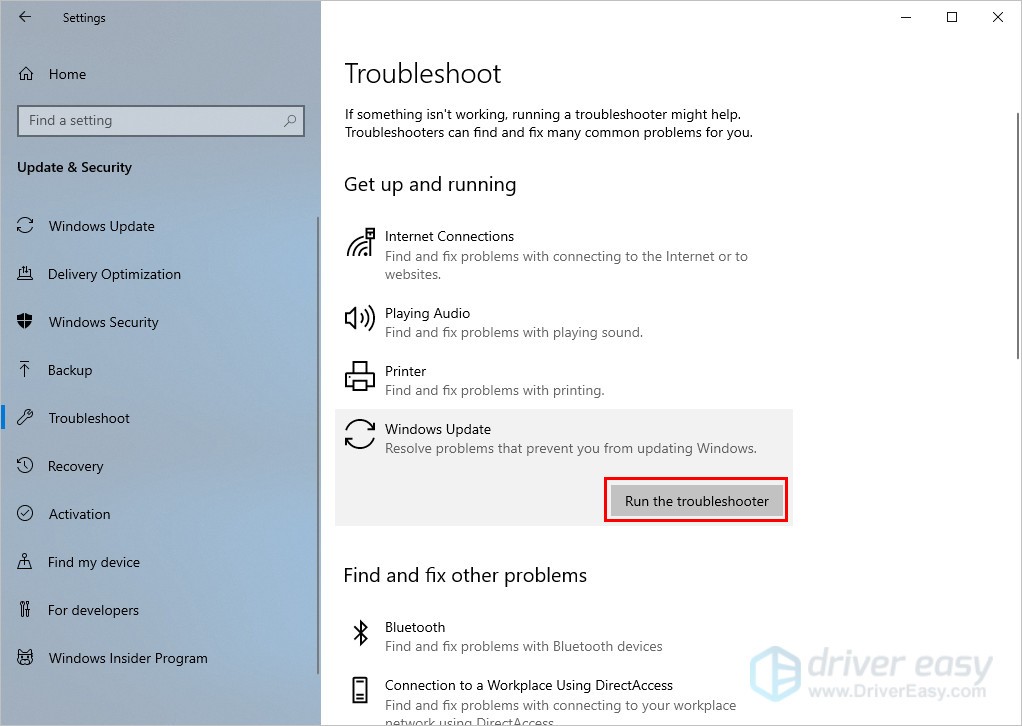
After finishing the troubleshooting process, restart your computer and check the blue screen error is fixed or not.
Fix 3: Repair system files
The Windows 10 blue screen error may be related to corrupt, damaged, or missing system files. To check if this is the exact cause, you can either use the Windows built-in tool to run a basic check or use an automatic tool to perform a complete diagnosis.
There are 2 ways to solve it. Here’s how:
- Option 1- Automatically (Recommended)
Use a repair tool to check various areas in your computer to determine the cause of Windows common issues. It will deal with issues related to system errors, and critical system files and find the right fix for you. - Option 2 – Manually
System File Checker is a built-in tool to check for corrupt, damaged system files and manage to restore them if there are any. However, this tool can only diagnose major system files, and won’t deal with damaged DLL, Windows Registry key, etc.
Option 1 – Automatically (Recommended)
Fortect is a computer repair software that can diagnose problems on your computer and fix them immediately.
It is tailored to your specific system and is working in a private and automatic way. It will first check hardware-related issues to identify problems, and then security issues, and finally it detects programs that crash, and missing system files. Once complete, it will find a solution to your specific problem.
- Download and install Fortect.
- Open Fortect and click Yes to run a free scan of your PC.

- Fortect will scan your computer thoroughly. This may take a few minutes.

- Once done, you’ll see a detailed report of all the issues on your PC. To fix them automatically, click Start Repair. This requires you to purchase the full version. But don’t worry. If Fortect doesn’t solve the issue, you can request a refund within 60 days.
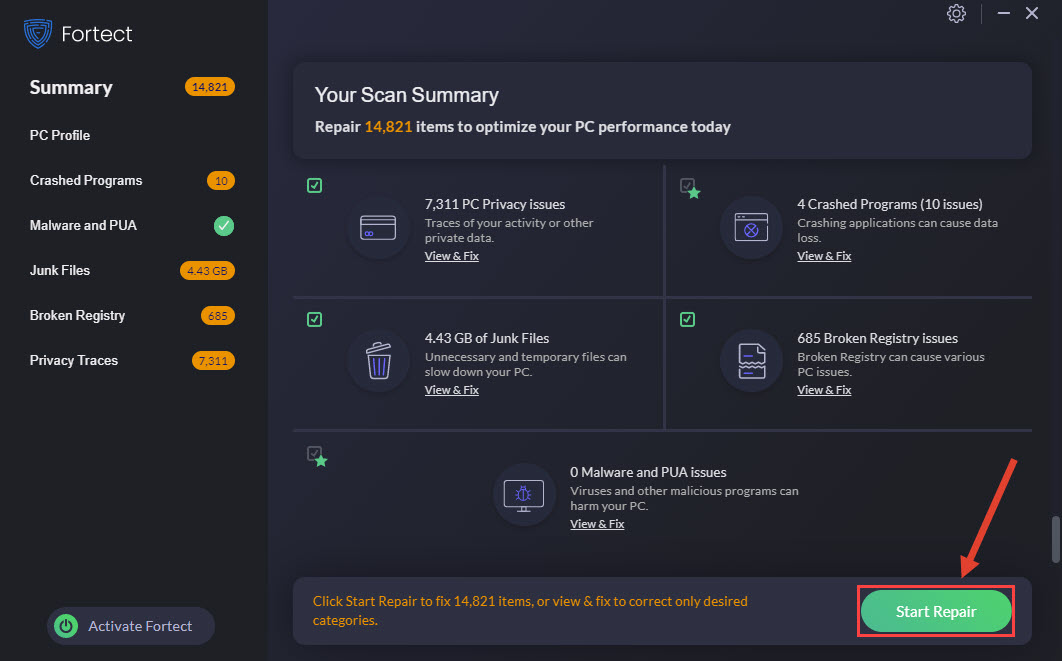
Email: support@fortect.com
Option 2 – Manually
- On your keyboard, press the Windows logo key and R key at the same time to invoke the Run box.
- Type cmd and press Shift+Ctrl+Enter together on your keyboard to open Command Prompt in the administrator mode.
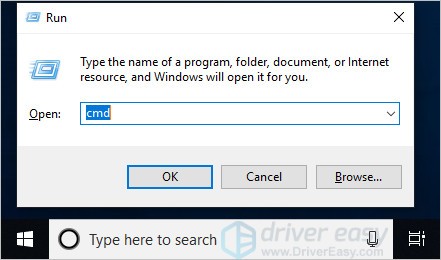
Note: Do NOT click OK or just press the Enter key as that won’t allow you to open Command Prompt in the administrator mode. - Type sfc /scannow (or copy-paste) and press Enter. Then wait for the verification is 100% complete.
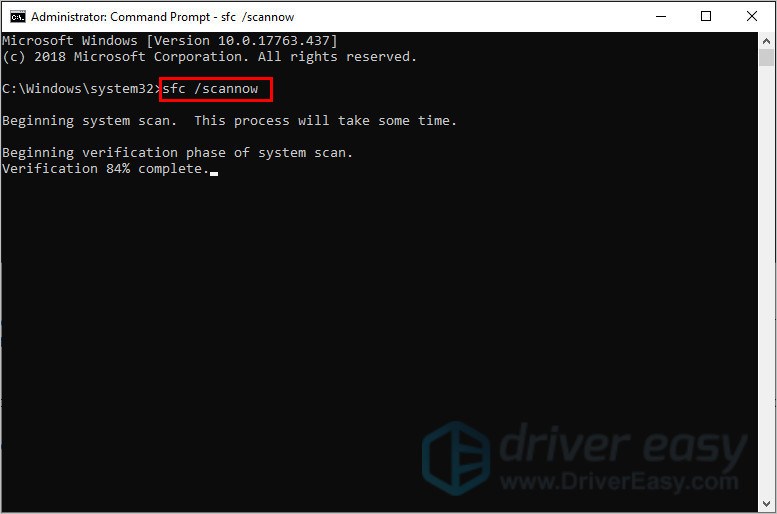
- Restart your computer to check the blue screen issue is fixed or not.
If the result indicates there are broken files but SFC can’t fix them, you can turn to Deployment Image Servicing and Management (DISM) Tool for deeper examination and repair.
Fix 4: Clear any existed viruses
The Windows 10 Blue Screen Error could also be caused by a virus attack.
So run your antivirus software to do a security scan and clear existed viruses or malware. Be sure that your antivirus software has been updated to the latest version.
Fix 5: Uninstall newly installed hardware/software
Have you installed any new hardware (like PC internal memory chips, internal hard disk drive, etc.) or any new software recently? If you have, the newly installed hardware/software may be the reason for the error. It is possible that new hardware/software is not compatible with your Windows system. So they may not work well there and cause the blue screen error.
Therefore, you can remove the newly installed hardware/software to solve the error.
Uninstall hardware: Shutdown your computer then remove every peripheral equipment and newly installed hardware safely. Then reboot your computer to check the blue screen will appear or not.
Uninstall software: In the steps below, we use the Battle.net as an example to demonstrate how to uninstall software safely. You can follow the steps to uninstall the newly installed software on your computer.
- Press the Windows logo key + Pause key together.

- Set Control Panel view by Category and click Uninstall a program.
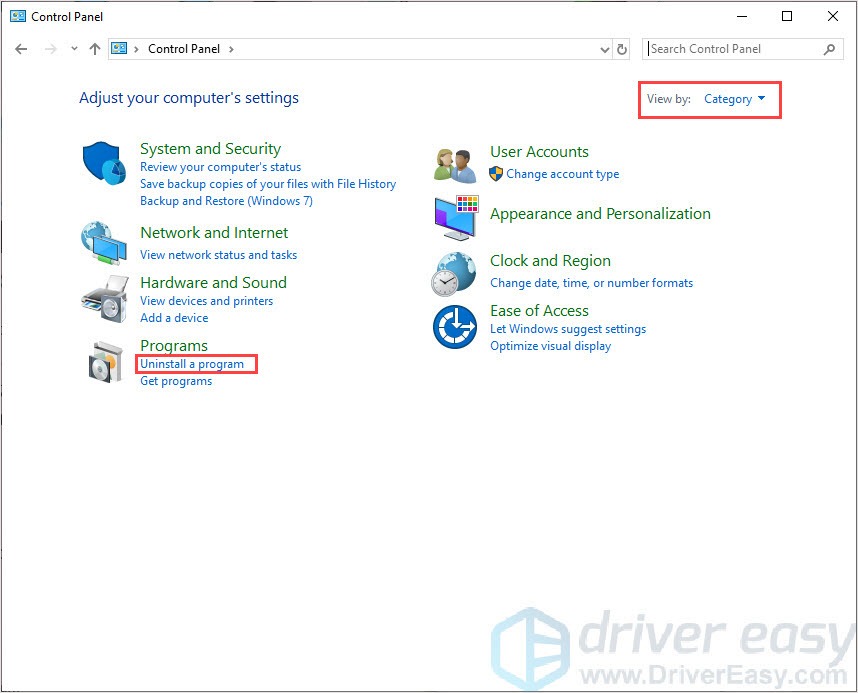
- Find your newly-installed program. Right-click on the program and click Uninstall.

- Follow the on-screen instructions and restart your computer to check the blue screen will appear or not.
Fix 6: Give your computer enough storage space
When you are trying to upgrade your computer operating system, no enough computer memory could also cause the blue screen error after upgrade.
The solution is quite easy. Extending your computer memory or you can free up some disk space.
Fix 7: Restore your system
If you can’t figure out which software or driver causes your computer blue screen error after update, you can restore your system back to a previous restore point.
This will roll back all the device drivers and software updates to the condition when you created the restore point.
- On your keyboard, press the Windows logo key + Pause together, then click System protection.
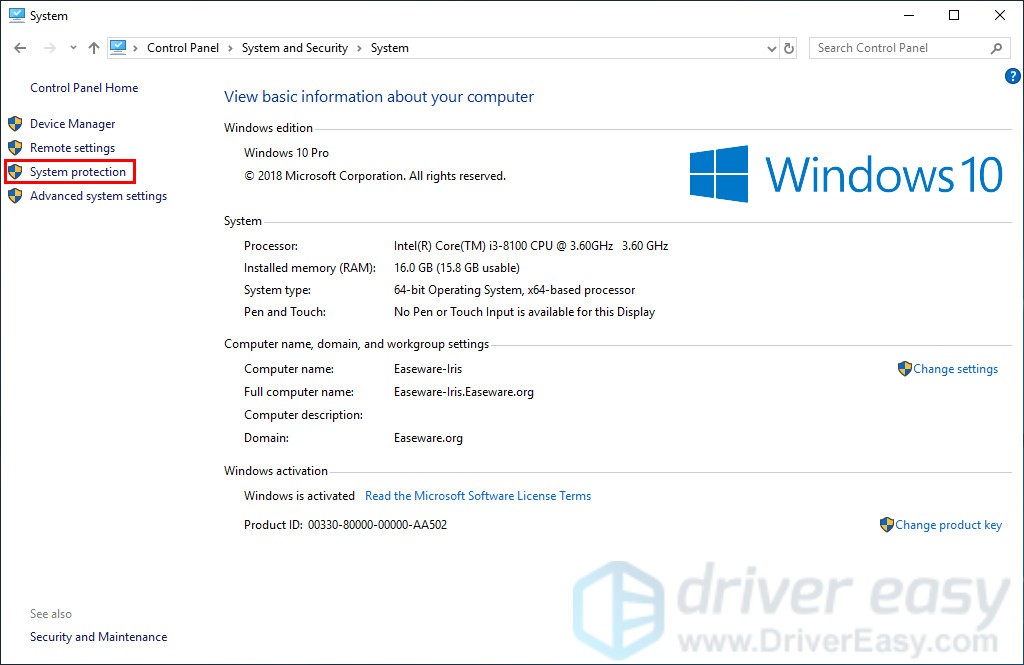
- Click System Restore.
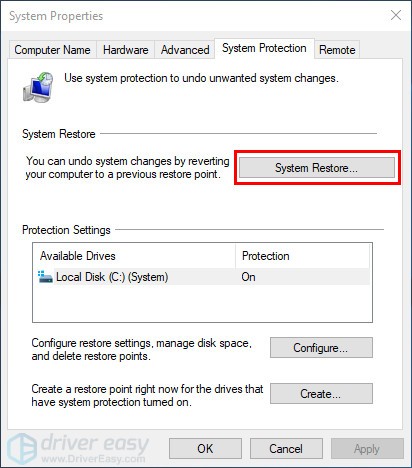
- Click Next and it will open the below window.
Choose a restore point where the Windows didn’t show any errors. Then follow the on-screen instructions to finish the process.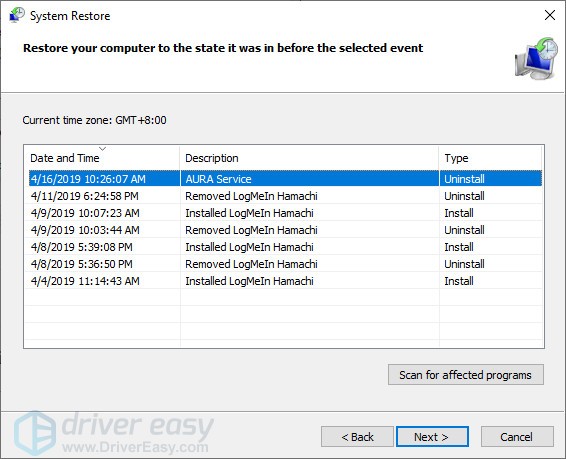
- Restart your computer to check the blue screen will appear or not.
Fix 8: Reset or reinstall Windows
If all else fails, you may have to reset Windows, or maybe even reinstall it together. We all know reinstalling will delete all the data on your hard drive, you have to back up all your important files before doing it.
However, with Fortect, there’s no need for lengthy back-ups, support phone calls, or risk to your personal data. It can reset Windows to the state exactly when it was just installed without affecting third-party software.
But treat these options as a last resort, because they both take quite a long time.
Hopefully, this article can help you resolve Windows 10 blue screen error after update. If you have any questions or suggestions, please leave a comment below, and we’ll do our best to help.



